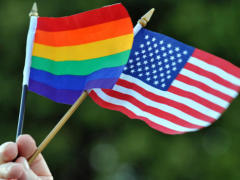Hobby Lobby bubbles up a fundamental tension between multiple different sets of competing core rights. The key issue is which right has priority and how do we decide?
First, we have the right of religious freedom, granted by the first amendment and thought by some to be a natural right.* Second, our right to be treated equally means that women should be treated on equal footing with men. That right is implied by the Declaration and by the Fourteenth Amendment. What equality for women means in this case is complicated and we come back to it. And third, we have a right to health care that is presupposed in the Obamacare. That right is not explicit in the founding documents but could be argued to be implied by the right to life, which is our most basic right. All of these various rights are colliding in Hobby Lobby. On top of this collision, there is the question whether a corporation, which is closely held by a group of people with religious interests, can be protected by rights that were originally created to protect individuals.
At the heart of the debate over the merits of Hobby Lobby is a tension between the right of equality and the right of religious freedom. The question is whether one or the other of these rights should triumph over the other. Here is how the two rights collide:
When the founders focused on freedom of religion, their intent was to prevent individuals from being penalized for their beliefs or practices. In fact, what triggered the Religious Freedom act, which was passed by Virginia Legislature and eventually influenced the First Amendment, was a bill introduced to tax individuals to support the clergy. The negative reaction to that proposal prompted James Madison to reintroduce the Bill for Establishing Religious Freedom that Jefferson had written in 1777 and failed to get passed in 1779, in the face of opposition among powerful members of the established Church of England in Virginia. The worry was that government was going to prefer or privilege one religion over another and to penalize individuals who didn’t comply. At the time, it was the Church of England that had the privileged position in Virginia, and the other Christian groups feared they would suffer. The Virginia Statute for Establishing Religious Freedom thus was originally intended to prevent one Christian group from leveraging the government power to suppress or punish those of Christian group.
The tables are now turned. The Hobby Lobby case focuses on whether a secular value can be imposed on a religious group. Is the establishment clause intended to protect the religious from secular values?
In this case the secular value in question is the equality of women and the right of women to be treated like their male counterparts. The health of males is protected under the Affordable Care Act. Therefore women’s health should be equally protected. Of course, the question is what “equally protected” means here in a situation where women need contraception and men don’t. Those who are upset by the Court’s ruling see contraception as central to a woman’s health. Therefore the exclusion of contraception means women’s health is protected less than men’s. This is why the coverage of ED treatment drugs such as Viagra is discussed since men’s reproductive health is not at issue.
Of course, men’s reproduction is not at issue because Hobby Lobby has a very traditional understanding of Christianity. And traditional interpretations of both Christianity and Judaism and have inequality built into them and in particular around the view of women’s bodies and women’s sexuality. As made evident by feminist religious studies scholars and activists in Christian and Jewish circles over the last forty years, traditional conceptions in the Judeo-Christian tradition often treat women as second class citizens whose bodies and sexualities are to be controlled. Both religions have male-centric symbolisms and practices that privilege men over women.
To be sure, traditional Christians would reject this view and argue that it is God’s will that women not use this kind contraception, which in their view kills a fertilized egg and is tantamount to murder. They would also argue that women are separate but equal and appreciated in other ways in their traditional understanding.
What is the upshot? If we privilege traditional religious understandings, then we will have to override our core value of equality. And if we embrace our core value of equality, we will have to ignore the commitments of some religious people who own corporations. Which way do we go in this case? Which value trumps which?
My own view is that we should err on the side of equality, which is the core commitment of this country. Without the commitment to equal rights, all other values go out the window. It was the commitment to the proposition that we are all created equal that led ultimately to a United States and to a Constitution that could even have a protection of religion clause.
Equality is the core value by which we are organized and the basis of all our rights, including even our rights of conscience. Of course, equality was not always understood fully and did not always include Baptists, Mormons, Jews, women, blacks and gays, among other minorities. If we start allowing traditional religious conceptions to trump the value of equality, it is only a matter of time before other social groups, such as gays, can’t get the care they need from the corporations they work for.
The protection of religious conscience and the establishment clause was intended to prevent one religion from suppressing another. It was an attempt to create a secular domain in which all religious people could interact without penalty and to relegate their individual religious differences to their private lives. Hobby Lobby wants to claim that the imposition of secular values —in this case equality— is a violation of that intent. However, if we don’t protect the notion of a secular domain in which all people are treated equal, then we undermine the very value that gave the first amendment its basis.
I take this position because Hobby Lobby is a corporation and not an individual. I recognize an individual’s right to free conscience and religious practice. Though Hobby Lobby is closely held, and its owners all share the same religious values, I don’t agree that the right of conscience should extend to corporations or override the right to equality. Corporations are entities that are created by laws and thus take advantage of and are created by the secular public domain in which business operates. For the same reason, corporations should not have a right to refuse service or even a job to a black, a Jew or a Gay, they should not have the right to decide what health benefits a woman receives. If we let corporations have varying laws, based on the values of the shareholders and their religions, then we have no public domain left in which our value of equality has any meaning at all. Without equality, we have no basis for religious freedom either.
________
*On freedom of religion being a natural right, see, for example, An Act for Establishing Religious Freedom, written originally by Jefferson in 1777, and proposed by Madison and passed in 1786 by the Virginia Legislature




